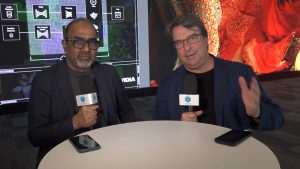Google’s Laptops Are Big Sellers
Hey Microsoft, if you’re in the car check the rearview mirror and move into the right lane. ![]() It looks like there is a laptop freight train called Google that’s about to pass you in sales.
It looks like there is a laptop freight train called Google that’s about to pass you in sales.
I just checked Amazon’s laptop bestseller-list, and among the top 17 laptop sellers there are four Google laptops, including the No. 2 seller. No. 1 is Apple’s 13-inch MacBook Pro. Four out of the top 17 best-selling laptops isn’t bad for Google after being on the market for only three weeks.
These Google laptops are the so-called Chromebooks, based on the Chrome OS, and they cost from $350 to $500. I have written about these extensively starting in early December 2010, including an article in March.
Of course, Google doesn’t produce the hardware, just as Microsoft doesn’t. Initially, Samsung and Acer have models in the market, but they are sure to be followed by others in the coming months. What makes this even more impressive is that Acer’s Chromebook won’t even start to ship until July 11, but it’s selling so well that it’s Amazon’s No. 17 best-selling laptop as of this writing.
The only two U.S. purveyors of the Google laptops thus far are Amazon and BestBuy.com. As far as I can tell, they haven’t even reached Best Buy’s stores yet, but I obviously haven’t checked more than a small number of Best Buy stores. They are only available for purchase online, sight unseen. It’s even more impressive, then, that they are selling so well.
Who is buying the Google laptops? Let’s first stipulate who is not buying them — the general population. Most people, even those who live in Google’s Mountain View, Calif., zip code, haven’t even heard of the existence of a Google laptop.
Corporations, schools and other government entities are probably buying them in the hundreds of thousands. If you have converted at least some of your staff or students to Google Docs and Gmail, moving them away from expensive-to-maintain traditional laptops based on Microsoft and Apple is a no-brainer. The life-cycle cost savings are dramatic, and dwarf any quibbling of whether or how much cheaper a Chromebook is to buy on day one.
Clearly there is a segment of nerds who are early Chromebook adopters. These are the nerds who know precisely what they are buying, and know the Chromebook’s advantages and limitations. It may be a carefully chosen second computer for them.
There are at least two categories of laptop buyers who are highly skeptical of the Chromebook:
1. Those who have never tested it. As with so many other products over the years, such as Research In Motion’s BlackBerry or the iPad, it’s a bit hard to describe in the abstract. You know it when you use it, but you couldn’t have known before you were a user. It’s like studying to become a pig farmer versus actually being one. Actually, think of that analogy in reverse, with a positive outcome.
2. Computer snobs. Most reviewers of the Chromebook fall into this category. These are people who don’t care about cost, and they often have special needs for applications and usage scenarios unlike most of the general population. They just want the most capable computer, no matter the upfront or life-time cost, even though it is the wrong purchase for most general folk. I think of professional automobile journalists who skew their ratings to recommend BMW M3 and Porsche 911 over the Chevrolet Cruze and Toyota Sienna.
Here is the bottom line: The fact that Google’s laptops are now occupying four out of the top 17 best-selling slots on Amazon.com is a sign that the Chromebooks fit the need of a large portion of laptop users. With general population awareness still at close to zero, this is just the beginning.
I wrote many months ago that Microsoft and others can start packing it up, and this is now starting to play out. It will take years to play out, obviously, but Google’s early sales success with its laptops is impressive.
As it turns out, many users want to do only a few things with their laptops: Manage email, social networks, general Web surfing, and doing basic productivity work such as typing a document into Google Docs. I don’t know if this is 50% of the population or 70%, but it is a big slice for which the Google laptops are optimized and will win.
[Cross-posted at The Street]
A message from John Furrier, co-founder of SiliconANGLE:
Your vote of support is important to us and it helps us keep the content FREE.
One click below supports our mission to provide free, deep, and relevant content.
Join our community on YouTube
Join the community that includes more than 15,000 #CubeAlumni experts, including Amazon.com CEO Andy Jassy, Dell Technologies founder and CEO Michael Dell, Intel CEO Pat Gelsinger, and many more luminaries and experts.
THANK YOU









